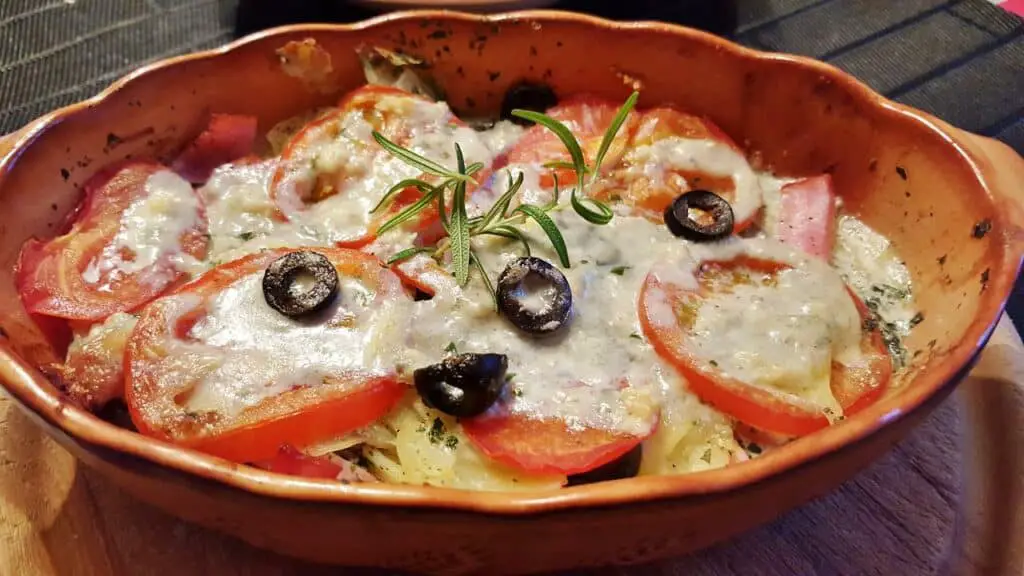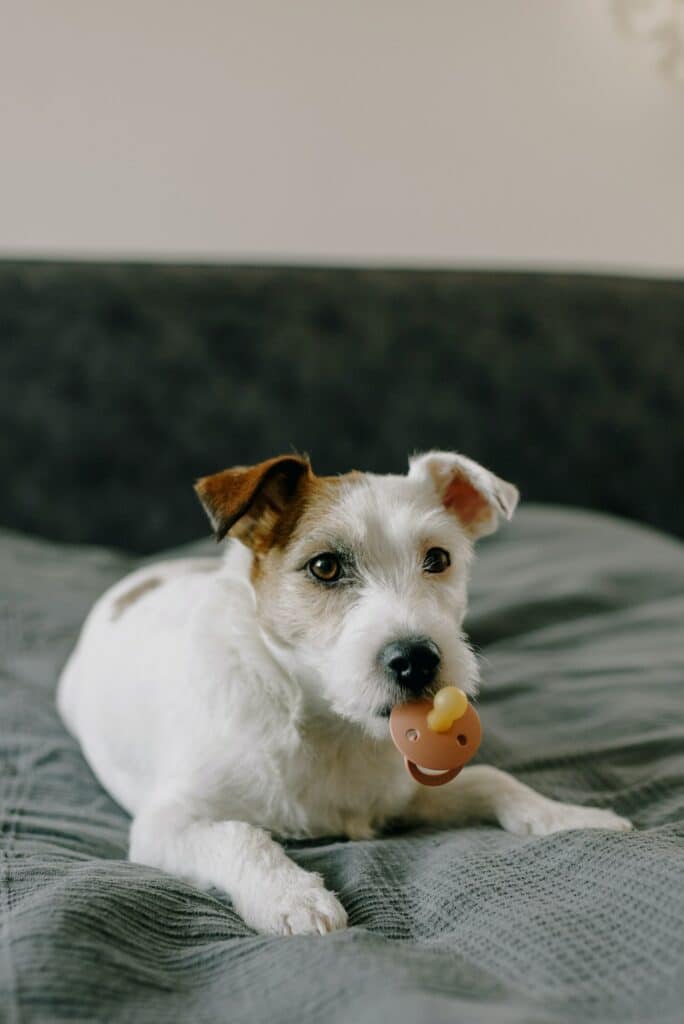Past research used to recommend carrots as healthy snacks for dogs.
These days, it’s becoming more common to give your dog special nourishing and other healthy treats.
For instance, vegetables like Kohlrabi can make wholesome dog treats.
However, before giving your dog kohlrabi, verify that it’s safe for him and won’t cause any health problems.
So, can dogs eat Kohlrabi?
Yes, dogs can eat this healthy treat.
In moderation, it’s a great addition to your dog’s food.
However, your dog might get diarrhea or vomiting after overeating it.
This article aims to determine whether dogs can consume Kohlrabi and what possible risks there may be.

Can Dogs Eat Kohlrabi?
When cooked, Kohlrabi is safe for dogs to eat.
This vegetable is low in calories but high in fiber.
This fiber can help dogs with digestion problems.
Kohlrabi can also help make up for any nutritional deficiencies in the dog’s diet and add some variety to meals.
Kohlrabi does not contain any toxins or chemicals that will immediately cause your dog any harm after consuming small quantities of it.
Kohlrabi does contain goitrogen, as do many kinds of cabbage, so avoid giving your dog large amounts.
Generally, these compounds pose little risk to dogs if you feed Kohlrabi to them in excess.
Yet, they can damage the thyroid gland when consumed in excess.
Your dog can also choke from eating Kohlrabi.
To avoid this, cut the hard vegetable into bite-sized pieces before serving it to your dog, as Kohlrabi can be difficult for them to handle.
Boiling it first is also imperative.
By cooking Kohlrabi, it’s easier for your dog to swallow and digest it easily.
Kohlrabi is safe to share with your dog and will provide the same nutritional benefits as other vegetables.
This makes it a useful addition to your dog’s diet.
Serve this vegetable to your dog as part of a meal or a snack.
Either way, it will be an excellent treat for your dog.

What are the Health Benefits of Kohlrabi for Dogs?
Among dogs’ healthy diets, Kohlrabi is an excellent option.
It’s low in calories and fat but high in fiber.
Fiber can help keep your dog’s digestive system work smoothly and prevent constipation.
Kohlrabi also contains vitamins A and K, essential for bone growth, vision, and blood clotting.
Kohlrabi contains antioxidants such as Vitamin A and vitamin E.
They help strengthen your dog’s immune system, reduce inflammation and promote healthy skin cells.
Antioxidants also fight off free radicals that cause disease, aging, and cancer in humans and animals.
They are good for the heart and circulation because they help eliminate toxins from your dog’s body and prevent plaque buildup in arteries.
However, this vegetable contains a small number of oxalates.
Oxalic acid can cause problems when consumed in large amounts.
Fortunately, dogs don’t need a lot of oxalate in their diet.
However, if your dog has a history of kidney stones, avoid Kohlrabi altogether.
What Happens if My Dog Consumes Too Much Kohlrabi?
Dogs love Kohlrabi.
Yet, just like humans, even the most delicious foods can get boring if we eat them all the time.
Too much of it is not suitable for your dogs.
Kohlrabi is a delicious vegetable that can benefit your pup’s health when eaten once in a while.
Your dog may experience discomfort if it eats a few too many Kohlrabi at dinner.
Too much fiber can upset the stomach and cause vomiting and possibly diarrhea.
In most cases, the issue will pass within a few hours, and you won’t need to take the dog to the vet.
Luckily, these problems are easy to prevent.
Just give your dog small amounts of food that contain Kohlrabi once in a while.
Ask your vet if this vegetable is appropriate for the dog when in doubt.

Is Raw Kohlrabi Safe for Dogs?
If your dog enjoys fruits and vegetables, Kohlrabi is an excellent alternative.
However, dogs should not eat raw Kohlrabi.
Even though Kohlrabi is a friendly vegetable low in calories and contains vitamins A, C, and K, it has psoralens.
Psoralens are substances that can cause photosensitivity when dogs ingest them.
They can burn your dog’s skin once exposed to sunlight.
The vegetable also contains a high concentration of sulfur-containing compounds (sulforaphane) that can be toxic to dogs.
That doesn’t mean you shouldn’t give your dog Kohlrabi.
Before feeding Kohlrabi to your dog, cut the chicken into small pieces and thoroughly cook it.
This will destroy the harmful compounds and any other chemicals that could cause stomach upset.
Can My Dog Eat Kohlrabi if it has Diabetes?
Kohlrabi is a cruciferous vegetable, which means it’s in the same family as broccoli and cauliflower.
Cruciferous vegetables are generally considered safe for dogs.
On the other hand, Kohlrabi poses a different problem for dogs with diabetes.
Even after cooking, Kohlrabi can still taste quite bitter.
It contains phytochemicals called psoralens, also found in other vegetables like parsnips.
When exposed to sunlight, psoralens become more harmful even though they possess many
health benefits.
Dogs with light-colored fur are particularly vulnerable to this.
If you give your dog undercooked or raw Kohlrabi, they might get a condition known as
phytophotodermatitis.
Phytophotodermatitis is an inflammatory reaction caused by exposure to sunlight after eating a
food containing psoralens.
So what does this mean for your diabetic dog?
Raw Kohlrabi is definitely out of the question regarding feeding time.
The dog might occasionally enjoy Kohlrabi if you thoroughly boil or steam it before serving.
Hence, how can you prevent this painful condition from occurring to your dog?
It’s straightforward: cook all Kohlrabi thoroughly before feeding it to your dog.
Final Word
Kohlrabi is pretty good for dogs and isn’t toxic when cooked.
However, moderation is important with everything.
So, no matter how much your dog enjoys Kohlrabi, we don’t recommend feeding it to him daily.
Kohlrabi as a treat is fine as long as your dog is otherwise healthy and doesn’t have any history of discomfort after eating it.
While it’s safe to eat small amounts occasionally, Kohlrabi can still add extra calories to your dog’s diet.
The risk of weight gain could arise if he is prone to doing so.
Moreover, consult your veterinarian when unsure whether your dog should eat Kohlrabi or other vegetables.
- What Dog Breeds Have Pink Skin? - March 24, 2023
- What Are the Most Inspiring Dog Breeding Quotes? - March 20, 2023
- Can Pheromone Spray Help Improve Dog Breeding Results? - March 19, 2023








